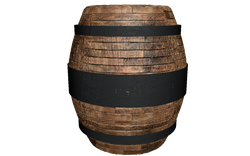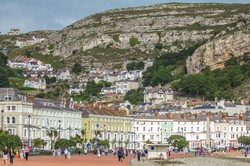In 1941 the SS Politician sailed out of Liverpool bound for America. She never made it there, for on a stormy night with difficult seas she ran into rocks in the Hebrides. There were few casualties, none fatal, but the ship was written off. However, this is where they action begins, for the wrecked freighter was carrying not only Jamaican banknotes,but thousands of bottles of whisky intended for sale in the USA,, which the residents of nearby Hebridean islands considered fair game. Thus there came a complex series of events when islanders and customs officers tried to get the upper hand.

The Wreck of the SS Politician
by frankbeswick
The film Whisky Galore is a hilarious comedy, the truth is more prosaic
The Wreck
In February 1941, when the war was not going easy for Britain, the SS Politician steamed out of Liverpool bound for the United States. Past the Isle of Man she went, through the narrows betwixt Britain and Ireland, up by Skerryvore lighthouse, through the Sea of the Hebrides towards its doom on the rocky island of Eriskay. The aim was to link up with a convoy heading west. But the captain had a hard decision to make. Was he to steer his vessel through the deep waters of the Sound of Barra, which were ideal U boat territory, or steer north through the narrow, shallow and rocky Sound of Eriskay, too shallow for U boats, but not an easy passage? He chose the narrow path and at 7.40 am on a night with bad weather and poor visibility the ship ran onto rocks, tearing a large hole in her hull. By 8.22 Captain Worthington gave the order to abandon ship and a lifeboat containing 26 of the ship's complement of 51 had been launched, but the waves were high and the lifeboat was driven onto a rocky shore. The crew scrambled ashore, with one minor injury. But the ship's radio operator had received the wrong position, informing the rescue craft that they were South of Barra. In the meantime a second boat had been launched and it had reached shore, with its crew informing the Hebridean islanders that the ship was loaded with whisky. The islanders quickly began to plunder the wreck.
The moral issue here was the long-standing clash between Scots and the customs and excise men, who were historic foes of the Scots people, enforcing customs duties for an unpopular government. Not that the English and the customs men were friendly, for there were times in eighteenth century when customs men and smugglers fought gun battles across parts of Southern England.There was also a historic difference in views between representatives of the large centralised state and local coastal communities, which claimed rights of salvage on abandoned goods. The result in this case was a story written as a comedy, but in reality no such thing.
The comedy version of this tale derives from the writings of Compton McKenzie, a writer living in the southern islands of the Hebrides at the time,but wise enough to stay out of trouble. He created a mythical cast of islanders just out for a bit of whisky. The comedic villain, not a bad one, was an Englishman named Captain Wagget, who is officious but not nasty. He took on the role of the deeply unpopular customs officer, McColl. The film, which I account one of my favourite films, presents a sanitised version of the events.
After the Wreck.
By the 8th of February a salvage vessel had arrived in Eriskay under the command of Commander Kay.but the wreck had been subject to plundering, and Kay discovered that some of the ship's stores and crew's private possessions had been taken. Into the fray swept the deeply unpopular McColl and his equally hard line boss, McGledhill, who suspected that some of the 22000 cases of whisky that the ship had been carrying had been "rescued" and he set out to find them, for as exported goods had had no duty paid on them. Having ascertained that some whisky was missing McColl commandeered a fishing boat and took a police officer with him and searched the coast. He stopped two boats and took the names of those found smuggling whisky, then the pair patrolled the beach and caught some others on the shore. With the support of McGledhill he confiscated the boats,which was a cruel act in an impoverished island community.
Yet others were involved, for there had been looters from the mainland and from neighbouring islands. These were quite wary, knowing that customs and excise wereafter them, and plenty of the whisky was hidden away. The customs and the police investigated the islands, but to little avail. The customs suspected that the police officers did not have the enthusiasm for the job that they had. The police were not enthusiastic about arresting their neighbours, and it is suspected that some turned a blind eye. To complicate matters the wreck was being salvaged, or at least as much of the freight was, and the salvage crews, who were billeted with the islanders were bringing them whisky! The salvaged whisky was sent to storage on mainland Scotland, but this did not prove to be an answer, as the looting continued. Nothing was going to keep the Scots from their favourite drink.
In the meantime plans to scuttle what was left of the wreck were drawn up. The ship could not be saved, as not only was there a gaping hole which had flooded the engine room and the hold that contained the whisky, necessitating the use of divers to rescue the goods, but the prolonged exposure to crashing waves had broken the ship's back. Eventually, the wreck was blown up to prevent further looting, causing shock and disgust at the waste of the whisky remaining in the hold.
But the custom's officers had not yet finished, and when the islanders whose boats had been confiscated pleaded for their return McGledhill refused. McColl lobbied the authorities to prosecute the islanders with the heaviest charges available to the courts. He was not going to let what in his eyes he saw as a rabble get away with giving the authorities a hard time. He wanted to make an example of these people.
Resolution
McColl did suffer retaliation, for there were threats against his person, But these never reached the courts. Moreover, one night someone, we don't know who, broke into the garage where his car was stored and poured in paraffin and lit it. His car was slightly damaged,but another was destroyed. The culprit was never identified.
The authorities on the mainland were not as hard hearted as McGledhill and did a deal with the islanders, selling their boats back to them, which was a fair arrangement. But the custom's officers plea for draconian sentences fell on deaf ears. A number of islanders were charged on the lighter charges of theft. Several were acquitted and others were found to have their cases not proven, which is a verdict between guilty and innocent available to Scottish courts. Some of the ringleaders were sent to prison, but far from draconian the sentences were mild, ranging from twenty days to two months. The wreck is lying on the seabed
Occasionally bottles of now undrinkable whisky are washed up on local shores, and one man who was refurbishing a house found four bottles hidden away and forgotten.
The films made about the story are fine comedy, but the truth is less happy. It is a tale of an impoverished community at a time of great hardship.
PAID LINK. I AM AN AMAZON ASSOCIATE AND EARN MONEY FROM QUALIFYING PURCHASES ON THIS PAGE.
Paid link
I am an Amazon associate and earn money from qualifying purchases on this page,
You might also like
A Strong Woman's StoryJane Evans went to War, but fought no one, for her mission was mercy and kind...
Sarn Helen. Through Wales on footSarn Helen is a Roman route which travels Wales from South to North, and the...






 Pilgrimage. A review15 days ago
Pilgrimage. A review15 days ago
 Leo the Fourteenthon 05/09/2025
Leo the Fourteenthon 05/09/2025
 The Melsonby Hoardon 03/25/2025
The Melsonby Hoardon 03/25/2025



Comments
The crown jewels werevstored somewhere secret, underground. But I am not privy to state secrets, so there is much that I don't know.
Interestinger and interestinger!
What -- artwork? the collection of individualized thrones that each crowned monarch warrants? ;-D the silverware? ;-D -- might the royal family have wanted to keep out of a victorious Nazi Germany's hands and where might such possessions -- and people? -- have been kept?
Would it be Canada? Would it be the British Virgin Islands (with the Unitestatesian Virgin Islands helping if only South Carolina hadn't started the revolution, the 1812 war and the interstate war?)
No, but there seems to be an unwillingness to let out all the details.whether it could or would be extended I don't know.
Thank you for the steamship meaning -- which I'd not have guessed -- to SS!
Interestinger and interestinger!
Is the 100-year embargo something that's carved in stone? Or might it be extended another century once we reach 2041 in just 18 years?!
S.S means steamship. Now here is the important thing.. The normal rule is that official documents are under a thirty year embargo, so why are the Politician's documents under a hundred year embargo? Rumour has it that the Royal Family were getting out their goodies ahead of Britain's losing the war. Then the ship sank. Justice? Who knows?
Thank you! Interestinger and interestinger...!
Rereading the comments and the text brought to my attention the title of your wizzley, which includes the name of the boat.
Can the name SS Politician be considered a somewhat strange name for a boat transporting hard liquor? Is it known why that name was chosen?
Also, what might SS stand for?
Farmers sometimes send their sheep for summer grazing onto uninhabited islands in rivers, lakes and the sea. I have a friend whose family sent their sheep to an island in the river Moy in Ireland for summer.The sheep would be taken by boat. The u boat captain guessed that there would be sheep there. I think that the story filtered out after the war when prisoners of war talked.
This gets interestinger and interestinger!
An isolated, uninhabited island had at least one sheep as a u-boat casualty!
The List of Inner Hebrides on English Wikipedia links Loch Laxford to the offshore, small, uninhabited islands of Dubh Sgeirean, Eilean à Chadh-fi, Eilean à Mhadaidh, Eileanan Dubha, Eilean an Eireannaich, Eilean an t-Sithein, Eilean Àrd, Eilean Dubh an Teoir, Eilean Dubh na Fionndalach Bige, Eilean Dubh nam Boc, Eilean Meall à Chaorainn, Eilean na Carraig, Eilean na Saille, Eilean Port à Choit, Glas Leac, Rubh' à Cheathraimh Ghairbh, Sgeirean Cruaidhe, Sgeir Eorna, Sgeir Fhanda, Sgeir Iosal, Sgeir Ruadh!
That same article lists for Gruinard island -- just south of Loch Laxford? -- the British government as looking at British-Isle vulnerability to German attack and to German vulnerability to British-organized anthrax attacks.
Might there be any guesses as to how the sheep got there, how many grouped together there, how the u-boaters knew about the edible sheep and how we knew about all this then and know about it now?
I don't know the name of the isle and it was uninhabited.
It must have been quite unsettling for the family who discovered that they were down one sheep. It must have been even more so once they reconstructed what happened.
It saddens me to think of that sheep being taken from her/his human and sheep companions and dying, perhaps quite painfully, away from them all.
Would that isolated island happen to have had a name and a population total?